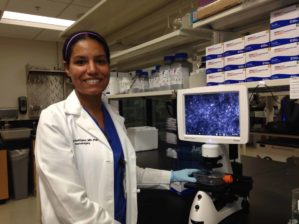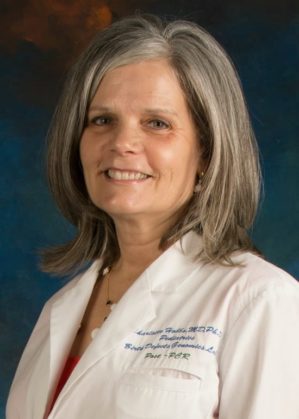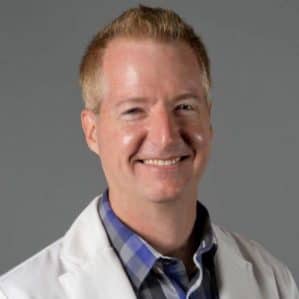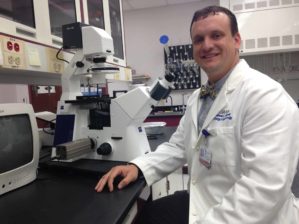Pediatric allergist and immunologist Josh Kennedy, M.D., wants to help kids with asthma avoid the life-threatening complications that too often develop from a simple cold.
Neurosurgeon Analiz Rodriguez, M.D., Ph.D., hopes to improve immunotherapies for cancer by better understanding why the body’s immune cells sometimes convert to a form that helps tumors grow.
Emergency medicine physician Michael Wilson, M.D., Ph.D., wants to find new ways to treat patients with opioid addiction and to improve care in the Emergency Department for those who are vulnerable to suicide.
These goals spurred all three UAMS College of Medicine faculty members to pursue careers as physician-scientists – and drew them to the college’s Clinician-Scientist Development Program.

As the third group of trainees to join the program since it was established in 2015, Kennedy, Rodriguez and Wilson are receiving substantial protected time for research for three years. Clinical work done in their remaining time provides the basis for their research and their pursuit of research funding.
Participants receive individual mentoring, specially tailored educational programs and access to activities with other clinician scientists and research training groups. Individual development plans are formulated annually for each member, and progress is evaluated twice a year by the program’s faculty advisory board.
The program receives funding support from UAMS’ Integrated Clinical Enterprise.
The aim is to increase the ranks of specially trained physician-scientists, who are vital in efforts to translate new biomedical knowledge into better clinical care. It is designed to help new clinician-scientists become independently funded for their research in today’s difficult extramural funding environment and to help them build fulfilling careers.

“For early-career physician-scientists to be funded by the National Institutes of Health, they have to be at the peak of their game,” said founding Director Charlotte Hobbs, M.D., Ph.D., a professor of pediatrics and executive associate dean for clinical and translational research. “They are only going to be funded if their grant application scores in the top 10th to 15th percentile. To accomplish that, they’ve got to have excellent mentoring and protected research time as well as enthusiasm and passion. That all comes together in our Clinician-Scientist Development Program.”
“I am really, really excited about this group of individuals,” said Hobbs, a pediatric hospitalist, epidemiologist and national leader in birth defects research who has received more than $100 million in external grant funding over the past 21 years. “All evidence points to these three new members having the appropriate background, early training and drive to have really outstanding careers as physician-scientists.”
Hobbs noted that the Clinician-Scientist Development Program was part of the recruitment effort for both Wilson, who joined the college’s Department of Emergency Medicine as an assistant professor in January and now also holds an appointment in the Department of Psychiatry, and Rodriguez, who joined the Department of Neurosurgery as an assistant professor in July.
“The presence of a well-established program run by a clinician-scientist was a big draw to coming to UAMS,” said Rodriguez. “Becoming a successful surgeon scientist is quite difficult, especially because of the clinical demands. The Clinician-Scientist Development Program’s protected research time, mentorship and professional resources, as well as the focus on collaborative work, are very important to me.”
Rodriguez earned her doctorate in pathology in 2008 and her medical degree in 2009 in the NIH-sponsored Medical Scientist Training Program at Case Western Reserve University in Cleveland. She completed her neurosurgery residency at Wake Forest University Medical Center in Winston-Salem, N.C., where she was awarded an American Association of Neurological Surgeons Neurosurgery Research Education Foundation research fellowship for her work in glioblastoma. She also was a Council of State Neurosurgical Societies Socioeconomic Fellow and a Congress of Neurological Surgeons Leadership Fellow during her residency. She continued her training in neurosurgical oncology as fellow at City of Hope National Medical Center in Duarte, California, where she specialized in immunotherapy trials.
“My research focuses on the tumor microenvironment,” Rodriguez said. “A person’s immune system can sometimes fight cancer cells. However, oftentimes the immune cells recruited to the tumor site are converted to a phenotype that actually makes them able to help cancer cells grow. My laboratory is interested in understanding how this happens and how we could convert the immune cells back to an anti-cancer phenotype.”

As with Rodriguez, the Clinician-Scientist Development Program was a plus for Wilson during his recruitment to UAMS.
“I am very pleased to be working with such a talented and diverse group of clinicians, and I am delighted to be here at UAMS,” said Wilson, who established the Department of Emergency Medicine’s Behavioral Emergencies Research lab. The lab focuses primarily on applied psychiatric emergencies that are of clinical relevance to emergency physicians. Recent projects have centered on suicide screening, agitation in patients, and the side effects of second-generation antipsychotics in an emergency department setting.
“Arkansas ranks No. 10 in the nation in suicide,” Wilson said. “We would like to reduce these preventable deaths to zero.”
Wilson received his medical degree from the University of Illinois at Urbana-Champaign’s College of Medicine in 2006 and his doctorate in psychology the same year from the university’s Department of Psychology. He completed his emergency medicine residency at the University of California San Diego (UCSD) and continued his training there as a clinical research fellow.
Wilson went on to become associate director of the UCSD Department of Emergency Medicine Clinical Research Scholar Fellowship while serving as an attending physician in the department from 2012 through 2016. He is a reviewer for several academic journals and has published broadly in the field of behavioral emergencies and agitated patients.
Kennedy graduated from the College of Medicine in 2006 and completed his residency at UAMS and Arkansas Children’s Hospital, serving as chief resident of the Medicine/Pediatrics Program in 2009-2010. He continued his training with a fellowship in allergy and immunology at the University of Virginia Health Systems in Charlottesville, where he began his research into the relationship between the rhinovirus and asthma.
“Sixty to 80 percent of children who are seen in the Emergency Department for asthma exacerbations will have evidence of the rhinovirus – the common cold,” Kennedy said. “Unfortunately, we do not understand the mechanisms of the rhinovirus that cause this very dangerous situation.
“We are studying the differences in the immune response to this virus between those with and without asthma. We hope that our research will lead to targeted approaches to keep children out of the Emergency Department.”

Kennedy joined the faculty in 2013 as an assistant professor of pediatrics and internal medicine in the Allergy and Immunology Section of the Department of Pediatrics. His research career got a kick start that year with a KL2 Mentored Research Career Development Scholar Award from the UAMS Translational Research Institute. In 2016 Kennedy received a five-year, $877,000 K08 training award from the NIH National Institute of Allergy and Infectious Diseases, which provides salary and laboratory support for his investigations.
The Clinician-Scientist Development Program is providing additional support for his lab – but Kennedy said the program’s benefits are much broader.
“The program brings together young investigators from different specialties across UAMS,” he said. “We are able to share ideas, discuss data and provide support to other clinician-scientists with different backgrounds and experiences. The university is large and clinician-scientists are relatively few in number. I doubt that I would be able to do this without the program.”
Rodriguez agreed. “It is easy to get isolated on a large campus,” she said. “The Clinician-Scientist Program provides opportunities to discuss pitfalls and successes with other clinician-scientists at various stages of their careers and research. Being a clinician-scientist is a unique experience, and certain questions can only be answered by colleagues who understand the professional demands from both the clinical and research sides of our world.”
